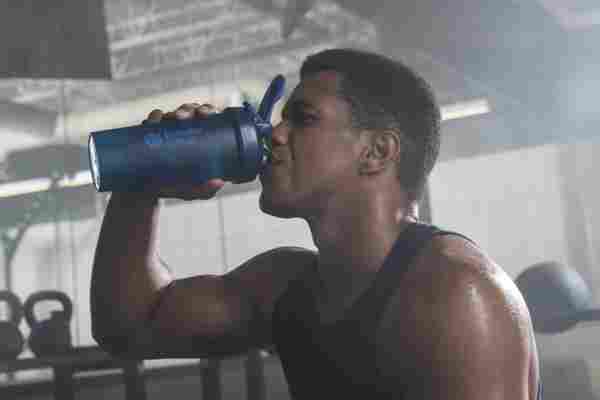What Does Protein Powder Do? (Everything You Need To Know)
Protein powder is a convenient, cost-efficient, high-quality source of protein that helps in muscle building and tissue repair. Additionally, protein powder can assist in enzyme and hormone production to improve weight loss and other chronic conditions.

Drinking protein shakes may provide you with the following health and fitness benefits:
Weight Loss
Protein supplementation can help in calorie reduction by influencing the hormones that stimulate and control appetite, including Peptide tyrosine-tyrosine (PYY), Glucagon-like peptide 1 (GLP-1), and Ghrelin [4,5].
Additionally, high protein diets can temporarily boost metabolism due to protein's high thermogenic effect, which accelerates the body's calorie-burning rate [6].
Also, it stimulates gluconeogenesis, the process by which glucose is synthesized from proteins and fats, assisting with weight loss [7].
Lean muscle retention
Supplementing workouts with protein shakes may help muscle recovery by increasing amino acid levels in the bloodstream, activating a stronger response when it comes to muscle synthesis.
In a 2017 study, the experimental group, which had an average daily intake of about 1.4 grams of protein per kilogram of body mass, was given an extra 36 grams of protein per day to supplement their resistance training [8].
The study discovered that supplementing a high protein diet increased muscle mass and strength during prolonged resistance training. Additionally, protein supplementation resulted in a decrease in fat mass and an increase in lean body mass.
Health Benefits Of Protein Supplements
Taking protein supplements can benefit overall health by lowering blood pressure and improving insulin sensitivity in patients with long-term medical conditions such as hypertension and diabetes [9] [10].
Furthermore, protein shake consumption, especially whey protein, was shown to strengthen immune function by reducing inflammation [11].
Also, whey protein has a high concentration of Cysteine, which assists the body's natural production of Glutathione, an important antioxidant in humans, to reduce oxidative stress [12] [13].
What Is Protein and Why Is Protein Important?
Protein is everywhere. Protein powder, protein supplements, protein shakes—if you go to the gym, you’re sure to see people drinking protein shakes and hear them talking about the importance of protein. But what is protein, anyway? What are protein shakes for? What is protein powder good for? Why all the buzz about different sources of protein?

What is Protein?
Proteins are large, complex molecules comprised of amino acids. They’re known as macronutrients (aka “macros”)—the nutrients that our bodies need in large amounts to create energy and fuel the activities of every physiological system. Protein, carbohydrates, and fat are the primary macros. We need each of them in our diets in order for our bodies to function properly.
Why Protein is Important
The importance of protein to our bodies is critical. Our organs, muscles, skin, hair, nails, and bones all contain protein. Protein is essential for the growth and repair of tissue and cells, it helps support a healthy functioning immune system, and it plays a role in manufacturing hormones. Simply put, protein plays a part in nearly everything we do.
Sources of Protein
Protein is found naturally in many foods. Some of the best food sources of quality protein are lean meat, fish, eggs, dairy products, quinoa, and chia seeds. Protein intake can also be supplemented with protein powder, most often mixed into a protein shake using a shaker bottle. Protein powder benefits people who don’t get enough protein naturally from their diets, or people—such as athletes—who have higher protein requirements. Understanding different sources of protein and how they fit into your diet is key for athletes looking to achieve their goals.
Importance of Protein for Athletes
For athletes, protein’s role in muscle growth and repair is perhaps its most important function. A protein-focused diet is key for anyone looking to bulk up. If your aim is to lose weight and you’re reducing your caloric intake, you still need to consume enough protein to prevent your body from turning to muscle tissue for energy, rather than burning unwanted fat. Even individuals who train purely for improved health and fitness (as opposed to targeted weight loss or muscle gain) should pay attention to protein intake, as it is critical in helping counteract the damage done to muscle fiber during strenuous workouts.
In addition to helping the body burn fat, rather than break down muscle tissue, protein benefits weight loss and weight maintenance efforts in a number of ways. Protein consumption increases the feeling of satiety (fullness), which helps reduce cravings and limit over-eating. Protein also has a higher thermic effect (the calories used to digest and metabolize food) than carbs and fat, which leads to a boost in metabolism. High-protein intake has been linked to reduced belly fat, as well as to long-term prevention of weight regain after weight loss.
How to Get More Protein
Now that you understand the importance of protein and protein powder benefits, you may be eager to try a protein shake. That’s where BlenderBottle® brand products come into play. Our best-selling shaker cups are perfect tools for mixing your protein drinks. BlenderBottle® brand shakers utilize our BlenderBall® wire whisk to mix the smoothest shakes imaginable, getting every last bit of protein powder to avoid gritty, lumpy shakes. The bottles’ screw-on lids and guaranteed leak-proof caps keep gym bags and car seats dry, making on-the-go protein intake easy and enjoyable. And with a wide range of designs and colors to choose from, you’re sure to find a BlenderBottle® protein shaker that fits your personal style while providing the functionality you need.
Looking to learn more about protein? Download our free Ultimate Protein Guide.
Protein Powder: Why & How To Use it
Protein powder remains a popular topic of discussion amongst the Sweat Community — you might have considered a nutritional supplement like protein powder if you have specific health and fitness goals. While you should be able to meet your daily nutritional requirements with high protein foods that form part of a well-balanced diet, a protein shake may be a convenient way to bridge any gaps and complement an already healthy lifestyle. If you are thinking about including protein powder in your healthy eating plan, it’s important to know the different types of protein supplements available and how to actually use them. What are the different types of protein powders? Protein powders can be derived from dairy, eggs, rice, soybeans or peas. While most women can meet their protein requirements by eating a wide range of whole foods, these supplements may be used to help you to reach your daily macronutrient targets if your daily protein intake is insufficient. Here’s what you need to know about some of the most popular types of protein powders available.

Dairy and egg protein These protein supplements are derived from eggs, milk and cheese. Whey protein powder Whey protein is the most commonly used type of protein powder and has several advantages: It’s easily soluble in water and it is a complete protein, containing all of the nine essential amino acids required for protein synthesis and muscle repair. Whey protein is quickly and easily digested and absorbed, helping you to feel satiated quickly. Most health food or supplement stores will have several different types of whey protein available. Whey protein concentrate (WPC) Whey protein concentrate contains around 70-80% protein, along with some lactose (the sugar found in milk) and fat. Most people prefer the taste of WPC over other types of whey protein. Whey protein isolate (WPI) Whey protein isolate contains around 90% protein, with less lactose and fat than whey protein concentrate. Whey protein hydrolysate (WPH) WPH or hydrolyzed whey is a pre-digested form of whey protein. It contains around 99% protein and dissolves much faster in water than whey protein. This type of protein powder tends to taste quite bitter, even when mixed with other ingredients. Casein protein powder Casein protein is digested and absorbed more slowly than whey protein. It isn’t as water-soluble as whey protein but it will keep you satiated for longer. This supplement can be used to aid muscle recovery overnight when daily protein needs aren’t being met in meals and snacks. Egg protein powder Egg-white protein powder is a lactose-free option that generally contains around 80% protein, including all nine essential amino acids. More research is needed to show if supplementing with egg white protein powder has a beneficial outcome on muscle recovery and training goals. In 2012, a small eight-week study of female athletes by the Tokyo University of Agriculture, Japan, compared supplementing egg white protein to an equivalent amount of carbohydrate. While there was a change in blood biochemistry, there was no difference in body composition or muscle strength between women — both groups saw an increase in fat-free mass and 1RM (a measure of muscle strength for a single lift) during the eight weeks. Collagen protein powder This type of protein powder isn’t as effective as whey, casein or egg protein powders for the purpose of muscle growth and recovery. However, it can help to support joint health, digestion and skin elasticity. BCAA’s If you’ve been training for a while, you may have heard of branch-chain amino acids or BCAAs. This supplement isn’t a complete protein powder. It contains the three amino acids that can’t be produced by the body: Leucine, isoleucine and valine. The powder is generally very bitter and is used either before or after a workout to promote muscle growth and recovery. A 2019 study led by the University of Sydney, Australia, found that long-term elevation of BCAAs in mice leads to obesity, overeating and reduced lifespan. More research is needed to confirm the long-term effects of elevated BCAAs in humans resulting from excess protein consumption. However, there is a strong correlation between high levels of BCAAs and obesity, insulin resistance and type 2 diabetes.
Plant-based protein powders For women looking to build muscle on a plant-based diet, there are protein powders made from plants that you may consider. Soy protein powder Suitable for vegans, soy protein makes a great plant-based alternative to whey protein as it also contains all the essential amino acids. It’s also low in fat and carbohydrates but doesn’t dissolve as easily in water as whey protein. Pea protein powder While pea protein powder contains all nine essential amino acids, it’s low in methionine — this can be overcome by combining pea protein powder with protein powder made from brown rice. Pea protein powder is also rich in iron, an important nutrient for women. Rice protein powder Protein powder made from brown rice contains all of the essential amino acids, but it is low in leucine. This can be overcome by combining it with pea protein powder, or with a healthy eating plan that supports your fitness goals. Hemp protein powder Hemp protein is a plant protein that is easy to digest. While it isn’t a complete protein source it does contain seven of the essential amino acids, as well as omega-3 fatty acids that are important for overall health.
How much protein do you actually need? To gain lean muscle and recover effectively from your workouts, you need around 1.6g of protein per kilogram (that’s 0.73g per pound) of bodyweight, per day. A 2018 systematic review, meta-analysis and meta-regression, led by McMaster University, Canada, found that protein supplementation in conjunction with resistance training above 1.6g per kg has no further impact on muscle strength or size. When it comes to fueling your body, more protein isn’t necessarily better. Consistently exceeding your daily protein requirements can have undesirable effects, including putting stress on your kidneys, dehydration or disruption of the digestive system. Once you’ve been training for a while and your body has adapted, you can decrease your protein intake to approximately 1.2g per kg. When you aren’t doing resistance training, you still need around 0.8g of protein per kg (or 0.36g per pound) to stay healthy. Should you take a protein supplement? Most women, even those who are training hard, can meet all of their protein requirements for muscle recovery by including regular portions of high-quality protein in their daily meals. A 2015 systematic review conducted by the US Army Research Institute of Environmental Medicine found that for untrained participants, taking a protein powder supplement in the initial weeks of resistance training, had no effect on muscle strength or lean muscle mass. As training duration, frequency and volume increase, a protein supplement may promote an increase in muscle size, strength, endurance and power. In 2020, the Harvard School of Medicine advises that protein supplements are a processed food that may contain additives, sugars, flavours and other chemicals. Further, protein supplements aren’t regulated in most countries, which means that the claims on the label are the manufacturers’ claims — safety and labelling of the products isn’t monitored and any claims are not generally independently verified. A 2018 study by a non-profit group called the “Clean Label Project” found that protein powders can also contain other contaminants that contribute to adverse health outcomes. According to a 2019 literature review by the Louisville School of Medicine in the US, protein supplementation should be a short-term solution to meet training demands, and should not replace long-term healthy eating habits.
How to use protein powder for post-workout recovery If you choose a protein supplement for convenience, opt for one that has a complete profile to ensure that you get the most nutritional benefit. When using protein powder directly after training to aid muscle recovery, it will be most effective when taken with a carbohydrate source. You might choose a supplement that contains carbohydrates, eat a piece of fruit or mix the protein powder with milk. Remember, refuelling after your training isn’t just about eating protein for muscle repair. To aid muscle recovery, your body also needs to rehydrate by drinking water and refuel carbohydrate stores. That’s why for most people, eating a healthy snack or your next meal is the best way to refuel after a workout!

